Synology DiskStation DS1813+ review
Synology’s latest DS1813+ desktop NAS appliance is packed with features and more ports than you can shake a stick at.
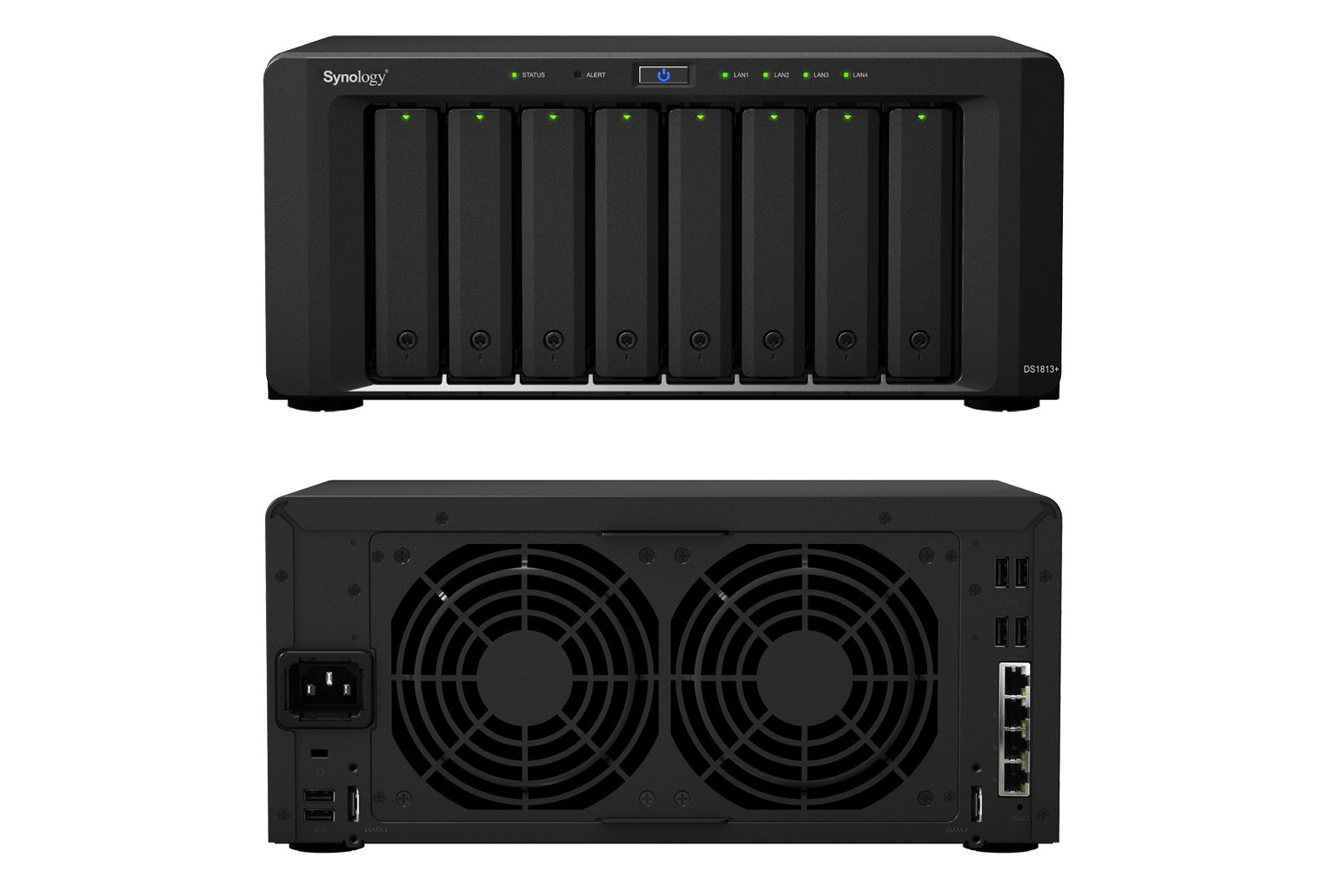
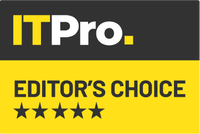
A good price, heaps of features, top Gigabit performance and a high storage capacity makes this compact desktop NAS appliance an excellent choice for small businesses.
-
+
Good value; Fast performer; Quad Gigabit ports; Huge range of features; High expansion potential
-
-
Only manual LUN snapshots supported

Synology's DS1813+ pushes port permutations to the max as it's the first desktop NAS appliance to offer quad Gigabit ports. There's much more as it teams these up two USB 3, four USB 2 and two eSATA ports as well.
Processing power is unremarkable as it sports a 2.13GHz Atom D2700 CPU. This chipset went end-of-life a while ago but is still a popular choice as it keep costs down. The 2GB of DDR3 memory can be upgraded to 4GB by removing the chassis cover and adding an extra SO-DIMM in the spare socket on the left side.
The DS1813+ scores well for expansion potential as the eSATA ports can be used to connect two of Synology's DX513 5-bay expansion units. These take maximum capacity to 72TB and Synology's volume expansion lets you expand RAID arrays onto new disks.
The appliance has two 12cm diameter fans which we found to be quiet. The system defaults to a Quiet mode but if things get a little toasty you can change to Cool mode which results in slightly more noise.
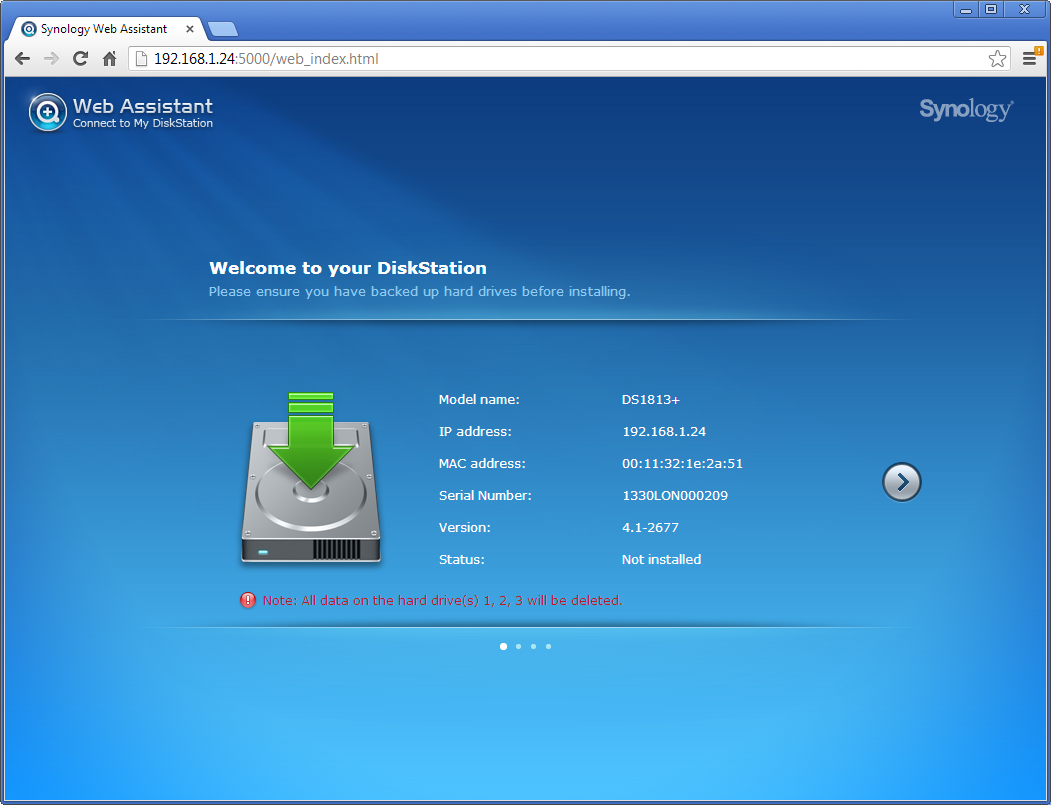
Synology's new Web Assistant makes light work of initial appliance setup
Installation
Disk loading is now tool-free as the hot-swap trays have plastic clips that snap into the hard disk screw holes. These work well and we had no problems slipping in a triplet of 4TB Western Digital Enterprise SATA drives for testing.
Initial installation is even easier as on first contact you no longer need Synology's Finder utility. Instead, you point a browser at Synology's new URL where it'll discover the appliance and apply the latest firmware.
It also offers to create a Hybrid RAID array using all available drives. This is great if you want to mix drives of different sizes and makes in the same array but in our case we skipped this phase and created a standard RAID-5 array.
Support for global hot spares is long overdue but this is now been remedied. You can designate a disk as a global hot spare which will be automatically grabbed if a member of any array fails.
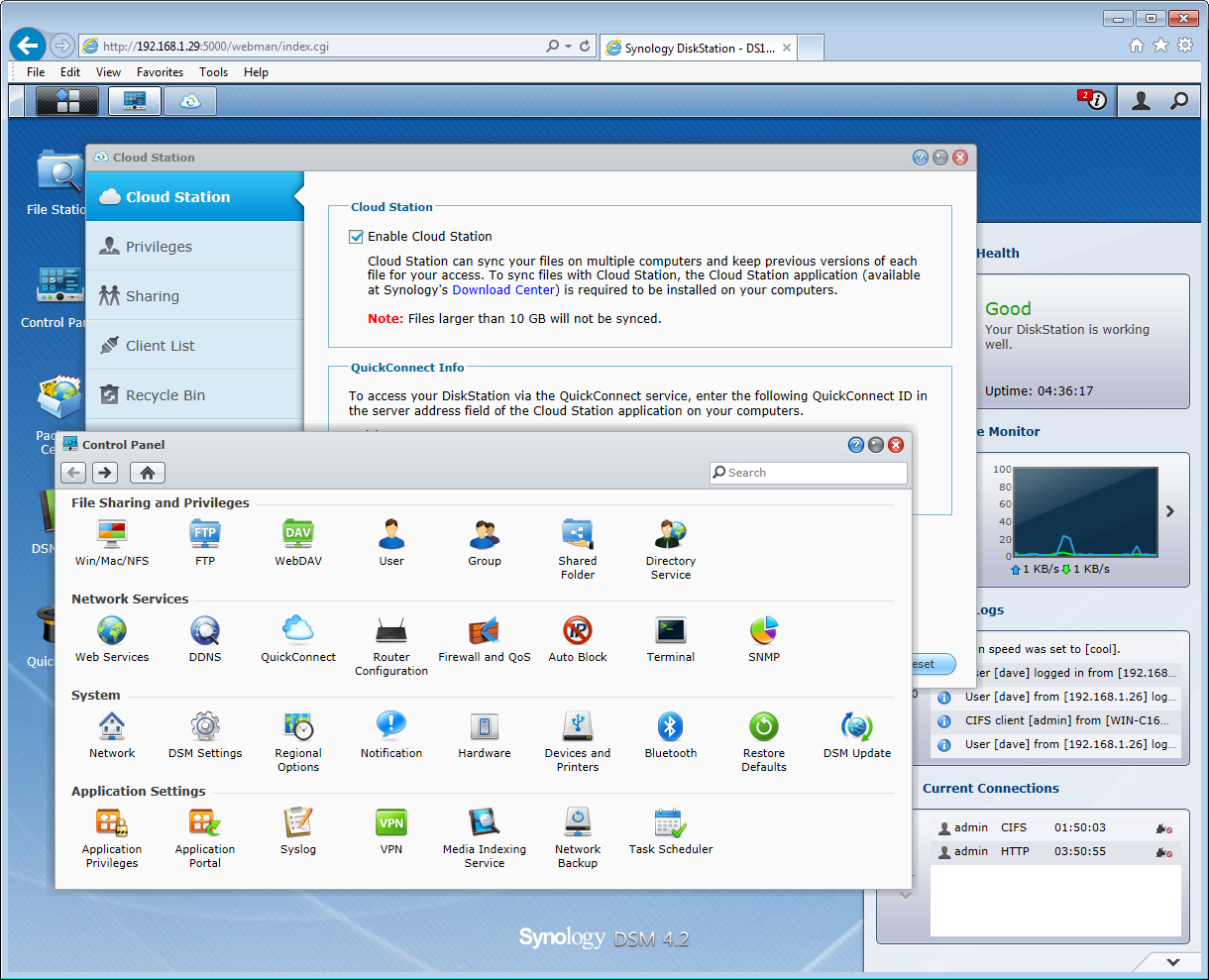
The intuitive DSM interface provides easy access to the myriad features
More new features
Enabling the advanced features during iSCSI LUN creation brings snapshots into play for point-in-time read only copies. A snapshot manager provides a list of all snapshots and you can either restore them back to the original LUN or use them to clone a new one.
Snapshots can only be taken manually and you must log off all initiators beforehand. Snapshotting a 500GB LUN took 80 seconds and using the SnapShot Manager to rollback the original LUN took 144 seconds.
You can beef up remote access security with 2-step authentication which requires users to enter a 6-digit one-time code as well as their password. You'll need a third party app to achieve this but the DS1813+ supports a choice selection including Google Authenticator.
The new task scheduler lets you run your own scripts, empty the recycle bin for selected shares, control specific services or just make the appliance beep. You also use it to run the new disk storage reports which we found capable of providing heaps of useful data about drive and quota usage, volumes, folders, files and owners.
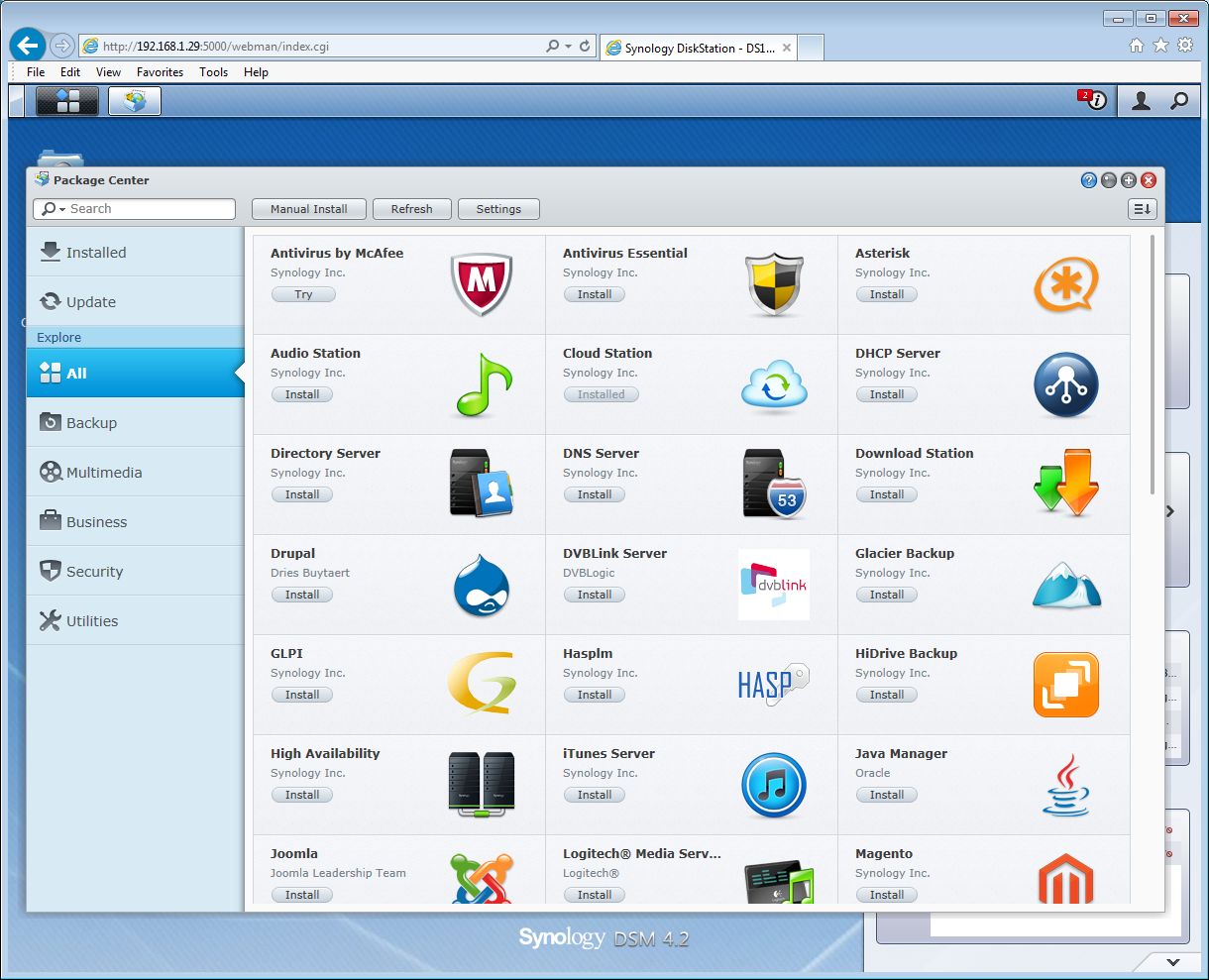
The appliance can be customised with an extensive range of freely available apps
Apps and clouds
Synology's Package Manager provides access to heaps of apps that can be installed with a single click. These include anti-virus scanning, VPN, DHCP, Syslog and LDAP servers, Amazon Glacier, HiDrive and Symform cloud backup plus Synology's excellent Surveillance Station IP camera monitoring and recording package.
Cloud Station brings in remote syncing services for up to 32 file versions. You install the Cloud Station Windows app locally, enter your account details and choose which folder you want to keep synced.
The QuickConnect feature doesn't require router port forwarding rules as you can enter a unique code in the Cloud Station interface instead of the service URL. We found it worked well and as we added files to our source folder or modified existing ones, they were immediately synced to the appliance.
To restore files you remotely access the appliance's File Station app and view your home directory. You can browse all file versions, choose which one you want to restore and download it to a location of your choice.
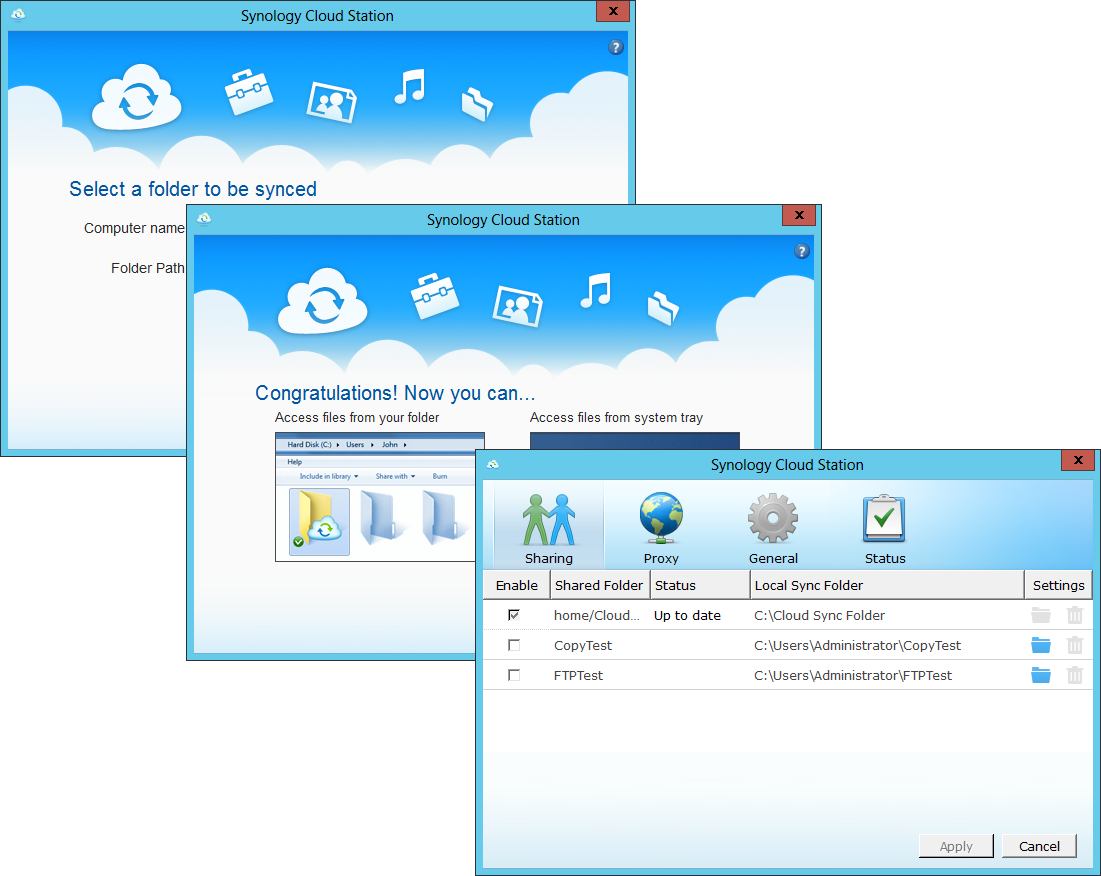
The Cloud Station provides a handy file syncing and recovery service for remote users
Performance
The DS1813+ doesn't disappoint in the performance stakes either. With a share mapped to a Broadberry Xeon E5-2600 rack server running Windows Server 2012, we saw Iometer report fast raw read and write speeds of 113MB/sec.
Real world speeds were equally good with drag and drop copies of a 2.52GB video clip returning fast read and write averages of 106MB/sec and 102MB/sec. General backup ops won't be a problem either with our 17.4GB mix of 10,500 small files copied to a share at 78MB/sec.
Basic backup services are provided by Synology's Data Replicator 3 which we found supports Windows Server 2012 although backing up our 17.4GB sample returned a slower 50MB/sec. IP SAN speeds are very good though, with a thinly provisioned 500GB target returning raw read and write speeds of 113MB/sec. Conclusion
With a diskless unit costing 622, the DS1813+ represents good value for money. Along with top performance, it packs in a huge range of features, offers quad Gigabit ports for multiple redundant links and can be expanded easily outside the box.
Verdict
A good price, heaps of features, top Gigabit performance and a high storage capacity makes this compact desktop NAS appliance an excellent choice for small businesses.
Chassis: Desktop
CPU: 2.13GHz Atom D2700
Memory: 2GB DDR3 (max 4GB)
Storage: 8 x hot-swap 2.5/3.5in SATA drive bays
Array support: RAID0, 1, 5, 6, hot-spare, JBODs, Hybrid
Network: 4 x Gigabit
Other ports: 2 x USB3, 4 x USB2, 2 x eSATA
Power: Internal PSU
Management: Web browser
Software: Synology Assistant, Download Redirector and Data Replicator 3
Get the ITPro daily newsletter
Sign up today and you will receive a free copy of our Future Focus 2025 report - the leading guidance on AI, cybersecurity and other IT challenges as per 700+ senior executives
Dave is an IT consultant and freelance journalist specialising in hands-on reviews of computer networking products covering all market sectors from small businesses to enterprises. Founder of Binary Testing Ltd – the UK’s premier independent network testing laboratory - Dave has over 45 years of experience in the IT industry.
Dave has produced many thousands of in-depth business networking product reviews from his lab which have been reproduced globally. Writing for ITPro and its sister title, PC Pro, he covers all areas of business IT infrastructure, including servers, storage, network security, data protection, cloud, infrastructure and services.
-
 Nvidia braces for a $5.5 billion hit as tariffs reach the semiconductor industry
Nvidia braces for a $5.5 billion hit as tariffs reach the semiconductor industryNews The chipmaker says its H20 chips need a special license as its share price plummets
By Bobby Hellard Published
-
 Business leaders are having a crisis of confidence over data literacy
Business leaders are having a crisis of confidence over data literacyNews A Salesforce survey reveals business leaders don't trust their data, or their ability to make the most of it
By Emma Woollacott Published
-
 MITRE CVE program handed last minute reprieve amid funding lapse concerns
MITRE CVE program handed last minute reprieve amid funding lapse concernsNews The MITRE Corporation's Common Vulnerabilities and Exposures (CVEs) database has been handed a last minute reprieve amid concerns over funding.
By Rory Bathgate Last updated